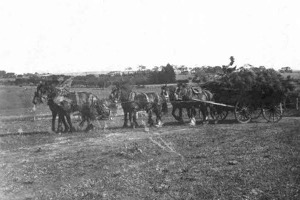William and Ann Brinsmead
The most prolific of the eleven Australian Brinsmead lines stems from William and Ann Brinsmead, who left St. Giles in the Wood in 1850 to settle a little South of Geelong in Victoria. William's brother Henry followed early the next year.
Early Days in England
William Brinsmead was born in St. Giles in the Wood in 1815, the son of William Brinsmead and Mary Ireland. He was one of six children, two boys and four girls. His father died in 1838. William married his cousin Ann Brinsmead, a daughter of Thomas Brinsmead and Margery Squire who lived on a farm in St. Giles Village.
William and Ann were married on December 2, 1839 at the Methodist Chapel, presumably the one built on Ann's father's farm right beside the farmhouse. In 1939, William and his brother Henry lost their leases on the estate in St. Giles. In 1841, the young couple were farming in the village of Alwington, north-west of St. Giles. The couple had three children before they left England, all baptized in the Methodist Church. They were Thomas Ireland (1841), Mary Ann (1844) and William (1847). By the time of the 1851 census the family was in Australia.
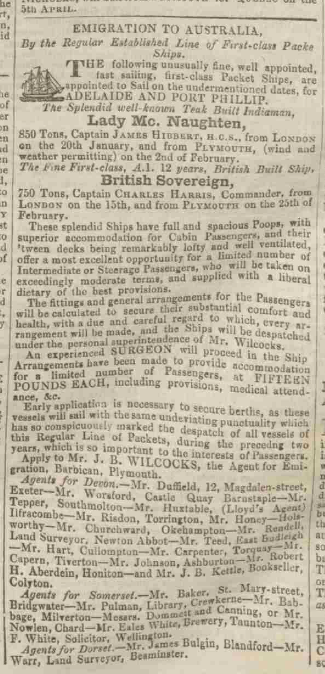
William's brother Henry married Ann's sister Betsy Brinsmead, who had previously married John Hackwill but was by then a widow. Henry and Betsy also emigrated to the Geelong area. They were certainly in contact once there. Another family member to emigrate to the area was Elizabeth, the youngest surviving daughter of Thomas and Margery Brinsmead and Ann's young sister.
The Trip to Australia
By the time William and Ann decided to leave for Australia, emigration had become quite popular. There was an Australian emigration scheme in effect, local agents had been appointed and advertisements for the voyage out were appearing regularly in the local newspapers. They chose to sail on the Lady McNaughten leaving Plymouth on February 2nd, 1850 - featured in the advertisement to the right from the Western Reporter.
The voyage originated in London, stopping in Plymouth and then proceeding south past the Cape of Good Hope and around the western side of Australia and into Adelaide, and then on to Port Phillip, which was the gateway to Geelong and Melbourne.
The Shipping Intelligence section of the Adelaide newspaper describes the bargue Lady McNaughton having left Plymouth on February 24th, arriving in Adelaide on Saturday June 15, 1850 under Master Hibbert and Ship's Surgeon Taylor. The passenger list included William Brinsmead and Wife with two children.
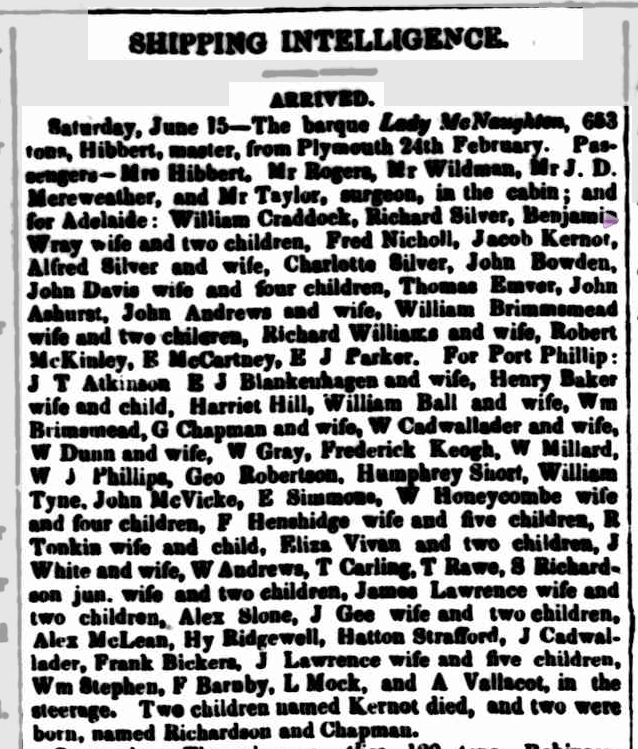
Arrival in Australia
The family arrived in Adelaide on June 15th 1850 and then sailed on to Port Phillip. They disembarked in Williamston (on the outskirts of Melbourne) some days later . They then made their way South to Geelong. William and Ann settled on a beautiful spot adjacent to Lake Connewarre. They built up the farm house in several stages and it is still there. They named the farm "Allens Week Farm" no doubt after the Allens Week farm in St. Giles in the Wood.
Their next child Elizabeth's birth is registered in Australia and her birth place is shown as Heads (1851) which is probably Barwon Heads, immediately south of the Lake Connewarre farm, or perhaps a reference to "Indented Heads" a loose term used for the area around that time. William is described as one of the early English squatters in the area; apparently a reference to those who simply settled on raw land before the formal settlement or selection process was established.
Once settled, the family grew, with twins Reuben and Henry arriving in 1856. Two more children, Edwin and Eliza were born but died at or soon after birth in 1860 and 1861 respectively. There has been some suggestion the couple also had an child named Fred, but we have found no record of such a birth. We suspect this is a mistaken reference to either Thomas Ireland's son Frederick William or Reuben's son Frederick Stuart. Thomas Ireland appears to have moved straight up to the gold mining area of Ballarat, North of Geelong.
Allen's Week Farm
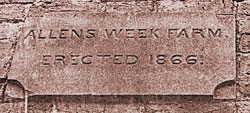
The farmhouse was obviously settled and built up over time. The two main buildings still in use have stones marking the dates they were built; the smaller 1866 and the larger 1870. Allens Week remained in the family for several generations. It was a dairy farm that later grew peas, potatoes and similar vegetables. It also had exotic trees on the land, useful for the commercial value of the bark. It was farmed first by William and later with the help of sons Henry and Reuben. Reuben moved to farm in Morwell in 1895, leaving Henry as the principal farmer, although his several sisters also lived on the farm and may have been less persuaded by the assumption that the men ran the farm. In their old age, Henry's father and mother-in-law, the Barkers, moved in. When Henry was ready to retire from farming, son-in-law Fred Gibb, who was married first to Ada Mable and, in later life, to her sister Emily, appears to have been involved in running the property.
William's great grandchild Hope recalled the farm having stables, barns, cow yards, a milk separator room and a blacksmith shop, with the house encircled by a white picket fence and an acre of gardens and lawns.
Brinsmead's Farm, Leopold, Victoria - Allens Week
We do not know when the family sold the property. A Mr. John Jackson bought the property in 1952, but it may not have been from the family.
The Geelong Advertiser, on January 17th, 1860, announced the death "On October 19th, at Kensington, Queenscliff Road, Eliza, youngest daughter of Thos. Brinsmead, near Great Torrington, Devonshire, England, age 32, deeply regretted by all who knew her. Home papers please copy." This was Ann's younger sister who had come out to live with them. .
In 1862, young William was admitted to the Geelong Infirmary for a wound.
In April, 1864 William Brinsmead offered for sale 50 acres of fenced farmland with a cottage stabling and a dairy, located about 8 miles from Geelong on the Queenscliffe Road.
The Methodist Church
William and Ann Brinsmead carried their strong Methodist faith with them to Australia. There were several Methodist families in the Kensington (Leopold) area, some Primitive Methodists, others, like William and Ann, Wesleyans. Another couple of similar faith was Henry and Margaret Barker who settled nearby. The Church's Centenary Book, published in 1960, records:
Early in 1855 one Richard Bowman, newly arrived from England, walked out from Geelong according to him 'along six miles of moderate road, quite straight, passing a few inns and a few houses or rather huts.' He was on his way to William Brinsmead's farm overlooking Lake Connewarre to attend one of the first Methodist services in Leopold; then known as Kensington....
The First Service
It is not quite certain whether the first Methodist services were held in William Brinsmead's kitchen or Henry & Margaret Barker's who lived near the Melaluka Estate. Melaluka road still survives. The Brinsmeads were Wesleyans and the Barkers were primitive Methodists, but a man known as William Williams recalls the kitchen services where flitches of bacon and ropes of onions hung from the rafters and old muzzle loading guns and two big pistols hung on the walls. The great stone fireplace was a favourite place for Roman Catholics and Protestants alike, as they gathered around the open fire in good fellowship of the Methodist service.
Another entry in the same book records:
The relationship between the Primitive Methodists and the Wesleyans is not clear but we know that William Brinsmead also gave an acre of land at Kensington. The Minute appearing in the Statement of church Property of the Wesleyan Geelong Circuit on March 1st, 1857 succinctly states, "Mr. Brinsmead must give a Deed." They did not waste any words in those days!
A contemporary account of the building of the first Methodist Church dates it a little earlier. The Geelong Advertiser reported, on November 23, 1855:
The Wesleyan Church - During the last few weeks the Wesleyans of Kensington have put forth their energies in the erection of a small place of worship on the estate of Mr. Brinsmead, near the western banks of Lake Connewarra, and on the left side of the road to Queenscliffe, about seven miles from town. Half an acre of land, and other liberal contributions having been given by Mr. Brinsmead , and others in the neighbourhood having taken up the matter with spirit, a neat little chapel to contain eighty persons is now completed, and was opened for devine worship by the Superintendent Minister, the Rev. Isaac Harding, of Yarra Street, Geelong, on Sunday the 11th inst. Yesterday, a special meeting was held, and about eighty friends sat down to tea; after which several interesting addresses were delivered, and collections were made which, together with a few small sums expected from friends who were unavoidably absent, will fully satisfy all debts contracted on account of the building.
Frontier Life
A few newspaper reports from the time make it clear that the Moolap - Leopold area South of Geelong was very much a frontier. In April, 1866, the Brinsmead twins, by then 11, ran afoul of one of their neighbours, Thomas Ash, for repeatedly, and despite several warnings, trespassing on his land. They preferred to walk across his right of way, unlocking his gate, despite signs and warnings to the contrary. The Magistrate called their actions reprehensible and very high handed, fining them each £10 and costs.
The Geelong Advertiser (the "Addy") report from October, 1877 demonstrates, at 21, the Brinsmead twins still had a less than deferential view of local law enforcement:
The Brinsmeads, of Kensington, would appear to be a very happy family. At the County court , yesterday, a young man named Reuben Brinsmead was summoned to show cause why he should not be compelled to pay the amount of a verdict given against him at a previous sitting for carelessly using fire, to the injury of a neibourgh of his named Richardson. When put in the witness box the young fellow put on a very indifferent air, and on being questioned by a solicitor with reference to his means, he coolly informed him that he had no property, took no wages; in fact worked for nothing. He said he worked with his father, and was quite content to get pocket money when he wanted it. "Have you not bought things in your own name?" asked the solicitor. "No," replied the wary individual; "I have purchased things, but if I have not got enough money I always tell them to go to father and he'll give them the money." He subsequently amused all the Court by stating that "he took no thought for the morrow." A brother of this witness was afterwards put in the box, and he fully bore out the statement of his brother with reference to his receiving no wages. He said he received none himself, but, in answer to Mr. Cock, said he "did take thought for the morrow."
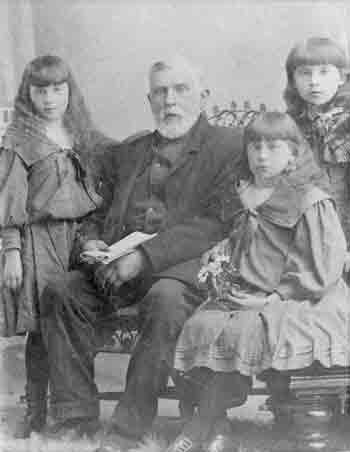 Olive, Maggie, Grandfather William and Rhoda Brinsmead, circa 1896
Olive, Maggie, Grandfather William and Rhoda Brinsmead, circa 1896 An article in the Advertiser earlier that year described the event that led up to the case, at the same time providing a description of the Brinsmead farm and the neighbouring properties. The Brinsmeads had a paddock consisting of grassland. A man named Wallace had a 40 acre piece of grassland next door and, beyond that, Richardson had a garden with an apple and pear orchard. Reuben Brinsmead, in order to burn out a snake, set fire to a log, but without sufficient precautions to prevent the fire spreading. The surrounding grass caught fire and the fire spread right across Wallace's grassland to Richardson's orchard and garden, burning down four or five chains of fencing in the process. Richardson was not well pleased.
The farm must have been somewhat mechanized. An add in the Addy on November 18, 1879 offered for sale (cheap!) a secondhand Threshing Machine; apply to W. Brinsmeade (they spelt the name wrong even then), Kensington.
Retirement
Once Henry and Reuben had taken over the farm, William eventually retired and moved into Geelong. One of his tasks there was to be keeper and gardener to the Methodist Cemetery. When he was dying, and not wanting any fuss made over his funeral, he said to his son Henry, "Don't take my body to the church, just bury me and hurry back to milk the cows".
Family Memories
William Brinsmead, shown to the left on the farm in old age, was remembered as a conservative Methodist who never drank, played cards or smoked. Great-grandson Reg Brinsmead recalled the old Brinsmead homestead, Allens Week Farm, very well. He recalls the house was beautifully finished, complete with a Brinsmead piano (later in the possession of his sister Roma). Granddaughter Hope Brinsmead recalled that each Sunday, while William was still living on the farm in his own little wooden cottage, the older children had to line up outside his door waiting their turn to recite the ten commandments. Those who made a mistake had to go to the end of the line and start all over again.

